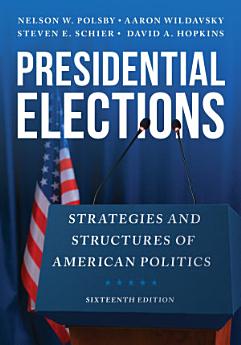Presidential Elections: Strategies and Structures of American Politics, Edition 16
জুল ২০২৩ · Bloomsbury Publishing PLC
ই-বুক
328
পৃষ্ঠা
reportরেটিং ও রিভিউ যাচাই করা হয়নি আরও জানুন
এই ই-বুকের বিষয়ে
Polsby and Wildavsky’s classic text, now updated by Stephen Schier and David Hopkins, argues that the institutional rules of the presidential nomination and election processes, in combination with the behavior of the mass electorate, structure the strategic choices faced by politicians in powerful and foreseeable ways. We can make sense of the decisions made by different political actors—incumbents, challengers, Democrats, Republicans, consultants, party officials, activists, delegates, journalists, and voters—by understanding the ways in which their world is organized by incentives, regulations, events, resources, customs, and opportunities. Thoroughly revised and updated, this Sixteenth Edition provides everything students need to know about presidential elections going into the 2024 cycle.
লেখক সম্পর্কে
Steven E. Schier is Dorothy H. and Edward C. Congdon Professor of Political Science Emeritus at Carleton College. He is the author or editor of 23 books including The Trump Effect: Disruption and Its Consequences in US Politics and Government and Polarized: The Rise of Ideology in American Politics, both with R&L.
David A. Hopkins is associate professor of political science at Boston College. He is the author of Red Fighting Blue: How Geography and Electoral Rules Polarize American Politics (Cambridge University Press), and Asymmetric Politics: Ideological Republicans and Group Interest Democrats (Oxford University Press). His political analysis has appeared in the New York Times, Washington Post, and Vox, and he is a contributing columnist at Bloomberg Opinion.
Nelson W. Polsby was Heller Professor of Political Science and past Director of the Institute of Governmental Studies at the University of California, Berkeley, where he taught American politics for forty years.
Aaron Wildavsky was Class of 1940 Professor of Political Science and Public Policy at the University of California, Berkeley, and founding dean of Berkeley's Graduate (now Goldman) School of Public Policy.
David A. Hopkins is associate professor of political science at Boston College. He is the author of Red Fighting Blue: How Geography and Electoral Rules Polarize American Politics (Cambridge University Press), and Asymmetric Politics: Ideological Republicans and Group Interest Democrats (Oxford University Press). His political analysis has appeared in the New York Times, Washington Post, and Vox, and he is a contributing columnist at Bloomberg Opinion.
Nelson W. Polsby was Heller Professor of Political Science and past Director of the Institute of Governmental Studies at the University of California, Berkeley, where he taught American politics for forty years.
Aaron Wildavsky was Class of 1940 Professor of Political Science and Public Policy at the University of California, Berkeley, and founding dean of Berkeley's Graduate (now Goldman) School of Public Policy.
ই-বুকে রেটিং দিন
আপনার মতামত জানান।
পঠন তথ্য
স্মার্টফোন এবং ট্যাবলেট
Android এবং iPad/iPhone এর জন্য Google Play বই অ্যাপ ইনস্টল করুন। এটি আপনার অ্যাকাউন্টের সাথে অটোমেটিক সিঙ্ক হয় ও আপনি অনলাইন বা অফলাইন যাই থাকুন না কেন আপনাকে পড়তে দেয়।
ল্যাপটপ ও কম্পিউটার
Google Play থেকে কেনা অডিওবুক আপনি কম্পিউটারের ওয়েব ব্রাউজারে শুনতে পারেন।
eReader এবং অন্যান্য ডিভাইস
Kobo eReaders-এর মতো e-ink ডিভাইসে পড়তে, আপনাকে একটি ফাইল ডাউনলোড ও আপনার ডিভাইসে ট্রান্সফার করতে হবে। ব্যবহারকারীর উদ্দেশ্যে তৈরি সহায়তা কেন্দ্রতে দেওয়া নির্দেশাবলী অনুসরণ করে যেসব eReader-এ ফাইল পড়া যাবে সেখানে ট্রান্সফার করুন।






